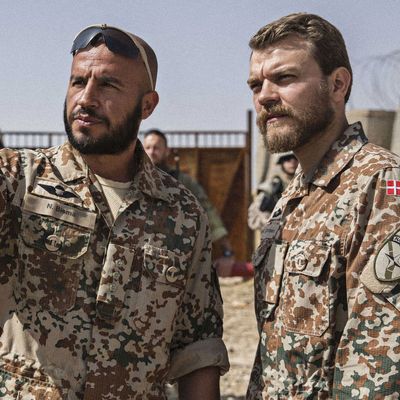
Tobias LindholmÔÇÖs┬áA War┬áis an upending morality play centering on Danish soldiers in Afghanistan, where their country (a member of the NATO alliance) has had a strong military presence since 2002. Who knew? The Danes, I guess, who canÔÇÖt be too happy that theyÔÇÖre still having to pay for the Bush-Cheney administrationÔÇÖs cock-ups in the early days of the invasion. In the movie, they donÔÇÖt seem too plugged into Afghan culture. The protagonist, Claus Pedersen (Pilou Asbaek), is a commander who commits, depending on your perspective, a tragic mistake or a war crime ÔÇö or both.
PedersenÔÇÖs squad is based in rural Afghanistan and charged with protecting civilians from assaults by the Taliban. HeÔÇÖs an unusually hands-on commander, embarking on patrols with his men even when he could stay on the base. HeÔÇÖs there when one of his company steps on an IED, loses part of a limb, and bleeds out in agony. Later, a traumatized soldier named Lasse begs to leave, but Pedersen tells him ÔÇö gently but firmly ÔÇö that he canÔÇÖt return to Denmark. Pedersen has to tell his own wife (Tuva Novotny) as much when she begs him to come home, saying their three sons need him. One boy is acting out toward other kids. The littlest one eats something he shouldnÔÇÖt and is rushed to the hospital.
Pedersen is similarly firm when an Afghan man and his family risk their lives when they show up at the gates of the base and beg to be taken in. Earlier, the manÔÇÖs young daughter had received medical treatment from the Danes for an infection, and heÔÇÖs convinced the Taliban will retaliate by killing him, his wife, and his children. Pedersen wonÔÇÖt be swayed, though, even when a fellow officer, a woman, gazes at him, appalled. Regulations are regulations.
I wonÔÇÖt spell out what happens next, but itÔÇÖs a worst-case scenario on many fronts ÔÇö an attack from all directions in a civilian sector by Taliban soldiers whom the Danes canÔÇÖt even see much less count. LindholmÔÇÖs camera techniques ÔÇö ultra-subjective, hand-held jitters and swerves ÔÇö donÔÇÖt seem fresh anymore, but his situation is novel, and crazy-making. That traumatized soldier he forced to stay is horribly wounded, and thereÔÇÖs no way a Medevac helicopter can land without information about the enemyÔÇÖs location that Pedersen doesnÔÇÖt have. Every choice is potentially disastrous. So-called ÔÇ£elementary rules of engagementÔÇØ donÔÇÖt seem so elementary anymore.
The last third of A War ÔÇö set in PedersenÔÇÖs house and then a Danish courtroom ÔÇö is in a different style than what has preceded it. ItÔÇÖs plain, prosaic, legalistic ÔÇö a different movie. But, of course, the filmÔÇÖs two pieces are not meant to fit together. PedersenÔÇÖs lawyer, as well as the soldiers under his command, ask how people can pass judgment when they werenÔÇÖt there, under fire. If itÔÇÖs difficult to dismiss the fierce moral outrage of PedersenÔÇÖs female prosecutor, itÔÇÖs almost impossible to root for a conviction. In both cases, humanity loses. But then, it has lost already.
I fear IÔÇÖm making Lindholm seem more morally relativist than he is. Art is said to be ÔÇ£the politics of the impossible,ÔÇØ so heÔÇÖs not required to pass sentence, to say whether he thinks Claus Pedersen deserves shame and prison and the designation of ÔÇ£war criminal.ÔÇØ What he is saying is that the man was out of his depth and that most if not all of us would be, too. That strikes me as an implicit condemnation of this particular occupation ÔÇö even though, in interviews, Lindholm has insisted heÔÇÖs taking no stand on the Western presence in Afghanistan. Maybe he really believes heÔÇÖs not. In his other films ÔÇö especially The Hunt, starring Mads Mikkelson as an unjustly shunned teacher, and A Hijacking, another thriller that comes down to terrible choices and ends on a bitterly tragic note ÔÇö Lindholm finds a unique balance between social and individual responsibility. ThereÔÇÖs plenty of blame to go around.
In any case, Pedersen clearly stands condemned in his own eyes. Although there isnÔÇÖt a scene in which he weeps or shares his anguish, Asbaek (who will be seen this year in another psychologically fractured role, Pontius Pilate in the Ben-Hur remake) plays him as frozen in time and unlikely ever to emerge from under his protective shell. A War confirms the darkest, least mentionable secret of traumatized veterans ÔÇö that what haunts them is not just what they saw and what was done unto them, but what they did.


